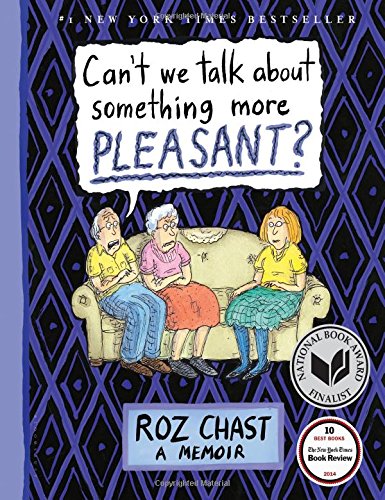What is a Medicaid Qualified Annuity?
 Aging in Place
Aging in Place
By Karen Cifala
Being the bearer of serious news is always hard, especially when the subjects are about aging, money, and death. Oh, and I forgot, taxes. I want readers to know that I am NOT always this somber — sometimes you have to just shake your head and smile. As cartoonist Roz Chast reminds us in her graphic memoir Can’t We Talk About Something More Pleasant?, life can be full of heartbreak, denial, guilt, and just plain stubbornness, and no matter what you do, it never feels like you are doing enough to make things better.
I love meeting new people with new ideas that might actually help someone. I recently met Tim Procita from Northwestern Mutual at a NAS (Network for Aging Support) meeting — meets once a month at Westminster Canterbury. He piqued my interest in this thing called a Medicaid Qualified Annuity. Tim says that this type of annuity can get around the Medicaid threshold of having assets of $2000 or less, and is designed to prevent the healthy spouse from becoming destitute. I thought, Wow, this Medicaid Qualified Annuity might be a perfect tool for spouses like my mom and dad.
Here is a good example of where a Medicaid Qualified Annuity might work for a couple: One spouse needs to be in a long-term care facility or a nursing home, and the other is relatively healthy and can still live alone. This annuity can help preserve their joint assets without having to pay out-of-pocket for the spouse that needs care. Sounds too good, right? Read on. Once the spouse is admitted to the long-term care facility, the Medicaid Qualified Annuity can be set up, making the spouse in the care facility eligible for Medicaid.
To make it clearer, consider this: A couple has $250,000 of CD’s at a bank, and the wife has $100,000 in an IRA, and they jointly own a car and house. The joint CDs and IRA would be rolled over into the Medicaid Qualified Annuity, subsequently taking the care facility spouse’s name off the CD and IRA. In most states the purchase of an annuity is not considered to be a transfer for purposes of eligibility for Medicaid — it is considered a purchase of an investment. This makes it a “non-countable income stream,” and as long as the income is in the name of the healthy spouse, it doesn’t create an issue. Easy, right? Read on: There is always a hitch somewhere.
There are 4 qualifiers that make the investment into the Medicaid Qualified Annuity a Non-Transferred annuity:
The annuity must be irrevocable, and you will not have the right to take the funds out.
You must receive back at least what you put into the annuity.
If the annuity is purchased with a term, it must be shorter than your life expectancy.
The state must be named the remainder beneficiary up to the amount that Medicaid paid on the behalf of the other spouse.
An annuity is a contract with an insurance company in which the owner pays a certain amount of money to the company and the company sends the owner a monthly check for the rest of his or her life. With the Medicaid Qualified Annuity, I believe whatever monies left in the annuity account upon the death of the “healthy” spouse are bequeathed back to the state. Really? Whatever for?
The easiest answer is that the state Medicaid program that is paying $10,000 or more to the care facility for the other spouse would like some money back, and Medicaid will be reimbursed up to the amount of the Medicaid paid for either spouse. Henceforth, the state is the “primary beneficiary” for the Medicaid Qualified Annuity and the family heirs are second in line.
I asked Tim why everyone wouldn’t do this if it’s such a good thing. One reason people don’t take advantage more often is that there are a couple of downsides. One downside is that a Medicaid bed must be available to the care facility spouse (which are sometimes limited and have waiting lists); also Medicaid dictates where and what kind of care will be received by the “in care” spouse.
Even though this article is designed to introduce you to a very powerful planning tool for spouses, it has to be used in the right circumstances. To get the full picture and to truly identify your personal needs, consult with an elder law attorney before making any decisions. They will be able to help you strategize and help you make the best decisions for you and your spouse before you fall off the moving sidewalk called life.
Thank you, Tim Procita, for introducing me to this helpful planning tool. Tim is a CFP/CLU Financial Advisor, and works hand-in-hand with many of the elder law attorneys in our area. Feel free to contact him at Northwestern Mutual by phone (304) 671-4551 or by email
tim.procita@nm.com.
tim.procita@nm.com.
Karen Cifala is a realtor for Remax Roots in Berryville. Contact her on her cell 303-817-9374 or by email kcifala@gmail.com should you have any real estate questions or just want to suggest another article to write about.















